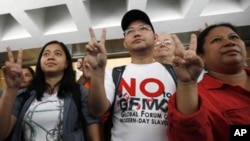Migrant domestic workers in Hong Kong won the right of permanent residency Friday, after a judicial review found that employment and immigration law discriminates against the city’s 300,000 predominantly Indonesian and Filipino maids.
Unlike the legions of white-collar foreign workers in sectors as diverse as aviation, banking and legal services, migrant domestic workers were not formerly entitled to permanent abode in Hong Kong after seven years’ continuous employment.
Holly Allan, manager of the support group Helpers for Domestic Helpers, said she was delighted by a verdict that reverses such discriminatory public policy.
“It is a victory for world migrant workers in Hong Kong. This means the Hong Kong judiciary respects that foreign domestic helpers have rights and should be accorded equal treatment before the law,” Allan said.
Friday’s challenge was brought before the High Court by Evangeline Vallejos, a former businesswoman from the Philippines who arrived in Hong Kong to work as a domestic helper in 1986.
Her lawyer, Mark Daly, argued that the rejection of Vallejos’s abode application violated the Basic Law, Hong Kong’s mini-constitution.
That law, implemented upon the territory’s return to Chinese sovereignty in 1997, enshrines significant legislative and judicial independence for Hong Kong.
However, ultimate appeal in cases of national significance can revert to Beijing, and within minutes of the court’s verdict the government indicated that it would challenge the ruling.
Daly expressed no surprise that an appeal would be lodged, but voiced his hope that it would take place in the Hong Kong courts.
“We think it’s irresponsible of some to even be thinking of going to Beijing, Daly said. "What sets us apart from other jurisdictions in the region is the rule of law. The government keeps talking about it, so have faith in the Hong Kong judiciary.”
The government response to the verdict was received by a Hong Kong public broadly opposed to the grounds of the review.
Protesters gathering outside the court argued that more than 200,000 maids would be entitled to residency. They say if those workers are joined by their family members, almost half a million immigrants could overwhelm Hong Kong’s education, medical and other welfare services.
Clarifying the government’s position at a news conference late Friday afternoon, Secretary for Security Ambrose Lee said the administration would apply for temporary relief from the court order by the end of October.
Before that appeal has been heard, the government would suspend all applications for permanent residency made by foreign domestic helpers.
Both Lee and advocates for Hong Kong’s maids believe that a case seen as a beacon for the rights of migrant workers across Asia is far from being settled conclusively.




